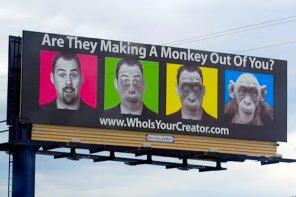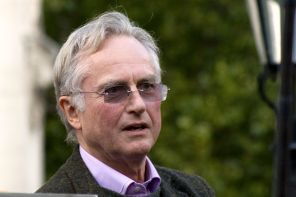Part of me thinks that reviewing Ben Stein’s new documentary, Expelled: No Intelligence Allowed, is stooping to a level I probably shouldn’t. But then I recall my scientist colleagues who have employed similar reasoning to avoid the evolution/creation conversation, and that this avoidance may have indirectly led to the production of such movies in the first place. It turns out that the movie has much to teach us—though certainly not in the way the producers intended.
Hosted by the former Nixon speechwriter and comedian best known for his bit part in Ferris Bueller’s Day Off, Expelled makes the claim that Academic Science has erected a wall around itself and the theory of evolution, and that anyone, including scientists, who dares to question evolution, who tries to scale that wall, is ostracized by the system. This, according to the movie, is an affront to freedom, a basic right upon which America was built. The movie focuses on five or six folks (all of whom are challenging evolution with the same idea: intelligent design) who claim to have been ruined by the Academy.
The movie is very well staged. Stein presents himself as a well-meaning, skeptical, and regular guy who wanders across a collection of disturbing events, which just don’t seem right. With the help of unlikely suspects like established scientists Richard Dawkins and William Provine (who come across a bit like babbling hellfire and brimstone preachers of science), the film manages to build a case that: 1) it is un-American to omit discussion of intelligent design from Science and the science classroom and 2) ‘belief’ in evolution logically leads to atheism and even the Holocaust. Yes, you read that correctly, the Holocaust.
The movie gets so much wrong here—in the science, in the framing of the issues, even in over-dramatizing and misrepresenting the cases of the ruined academics—that it’s difficult to know where to begin. In fact, I won’t even try, since the National Center for Science Education has already done an impressive job of addressing what the movie gets wrong in building its arguments.
Rather, I’ll come at it from another angle: What does the movie get right? And what can we learn from what the movie gets wrong?
First, while framing issues as ‘battles’ (evolution vs. creationism, science vs. religion) may sell books and tickets for both ‘sides,’ productive engagement and nuance is sacrificed. Expelled, on the positive side does show us some interviews with balanced, thoughtful scientist/religion scholars like John Polkinghorne and Alister McGrath. They discuss the value of science and religion and other ways of thinking, and how productive dialogues among them, rather than battle rhetoric, is the way to go.
Most striking to me is how much the movie tells us about the failure of American science education. Expelled can be seen, in some senses, as a product of that failure; a failure to teach science as a process that has much power but also significant limitations.
If the ‘creation/intelligent design/evolution controversy’ is a window into the American soul, then that window looks into the public school science classroom. This is where the odd, vituperative dance of religion and science has played out ever since the Scopes Trial in Tennessee (Expelled shifts the dance location only slightly into the halls of academe). And this is where the failure of science education has occurred.
Second, Expelled argues to bring intelligent design and, by implication, other ways of thinking into the classroom. I agree, but not in the way the movie and its proponents argue. When they push to ‘teach intelligent design (or creationism or other alternatives to science),’ they mean to do so on equal footing with science. As most any scientist will tell you, this won’t work because the idea of an Intelligence or a Creator, and most similar ideas of religion, are non-falsifiable, non-testable, in the way that any scientific idea must be.
I argue to introduce alternate ideas in the science classroom, but in a different way. And here is where I part company with most of my colleagues who say, ‘Creationism and intelligent design belong in history or religion class, but in my classroom I only teach science. Besides, I’ve got too much information to cover as it is.’ And there’s the rub: science is taught simply as information, as a collection of facts, and as if these facts exist in an ethical vacuum not connected to young Americans’ lives. Not only is this false, but it sets up a tension, a conundrum for these folks living in this most religious of countries: either I believe what my religious minister, family, and community say or I believe these facts my teacher is telling me.
What if we changed things? What if we taught about science as a process, and taught both its power and limitations? What if we taught in science class that there are other valuable non-scientific ways of looking at the world? Some are not scientifically testable, and so are outside the realm of the scientific method. If we put ideas beside each other and show which are scientifically testable and which are not and why, if we relate these ideas to the students’ own life experiences, what will happen?
Actually, the experiment already has been done in public high school science classrooms. And the results: students learn to appreciate science, its value, and how it works without rejecting or having to choose one worldview or another, and they learn the relevant science better than in a traditional science classroom.
Is it worth rethinking science education? Improving educator training so they can do this effectively? Absolutely. I bet more Americans would be attracted to, appreciate and consider careers in science (the number is decreasing annually). I bet we’d have more productive conversation among students and leaders of science and religion around the many profound issues in our nation that engage both: abortion, medical care, stem cells, homosexuality, and genomic research. The battle rhetoric would fade and, more than likely, movies like Expelled wouldn’t be made in the first place. We’d be less about selling books and tickets and more about moving forward.




